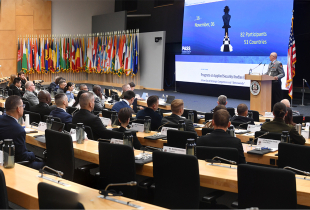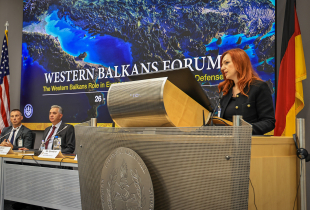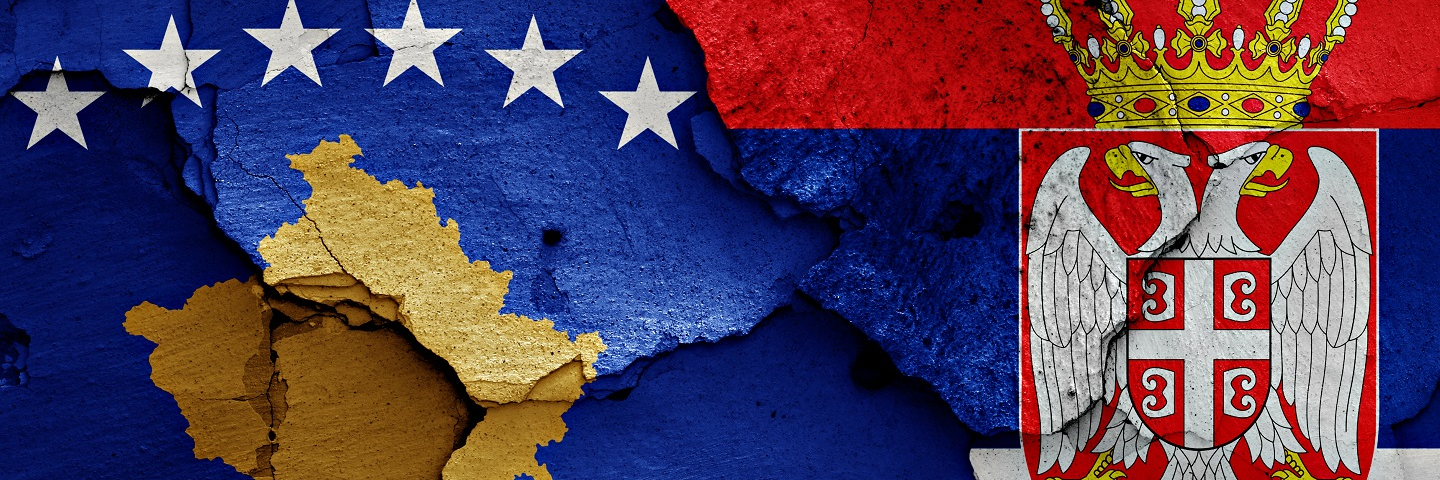
A Make or Break Year for Serbia and Kosovo?
Introduction
Instead of the hoped for turn to normalization, 2011 saw escalated tensions over Kosovo. Agreement on Kosovo’s participation in regional fora and Serbia’s formal advance to EU candidacy in early 2012 have revived a cautious sense of optimism, but unresolved underlying issues and approaching political contests leave the prospects for further progress uncertain. Warnings of precipices and powder kegs are overdone in the Balkans, but 2012 is shaping up as a potentially decisive year for international policy in the region. Despite the Euro-Atlantic community’s current internal challenges, integration into that community’s formal structures remains the best path for Balkan security and development. It is also a prerequisite for realizing the vision of a stable, democratic, and prosperous united Europe. The United States, European Union, and the countries involved in this process must use the coming months to avoid long-term setbacks to those goals.
Diplomacy’s Winding Course
In February 2008, nine years after NATO’s 78-day air campaign over Kosovo, that territory declared its independence. It has since been recognized as a sovereign state by 88 countries, including all of its neighbors with the exceptions of Serbia and by all NATO and EU member states except Cyprus, Greece, Romania, Slovakia, and Spain. Serbia’s challenge before the International Court of Justice (ICJ) marked the centerpiece of its strategy against Kosovo’s move. Winning support within the United Nations General Assembly in October 2008 for consideration of the case represented a significant success for Serbian diplomacy. However, the Court’s July 2010 decision that Kosovo’s act had not violated international law effectively closed off this challenge. Potentially positively for both sides, however, the case’s conclusion opened the way for direct talks on technical issues between Belgrade and Pristina under EU auspices. Finally launched in Vienna in March 2011, these discussions have been mediated by the appointed British diplomat Robert Cooper. While not touching the issue of Kosovo’s status, these negotiations have focused on practical matters such as cross-border movement, property rights, energy, telecommunications, and educational credentials. Despite considerable skepticism on both sides, an agreement on freedom of personal movement was reached in early July of last 2011.
Crisis interrupted negotiations within a few weeks, however. On July 25, angered by the Serbian government’s refusal to recognize and admit goods with Kosovo custom stamps as well as by non- enforcement of a retaliatory ban on Serbian imports by the European Union Rule of Law Mission (EULEX), Kosovo’s government sent special police to take control of two border posts. Serbs in northern Kosovo reacted by burning one of the posts, fatally shooting one of the police, and placing barricades across roads in the area. Troops from the NATO-led Kosovo international peacekeeping force (KFOR) moved to reestablish control and enforce freedom of movement, and EULEX resumed management of the crossings in mid-September. Still, border trade was suspended for more than three months as blockages and violent clashes continued. One particularly tragic incident in late November resulted in the injury of several dozen protesters as well as 30 German and Austrian KFOR soldiers.
At the insistence of the European Union and the United States, negotiations resumed. An agreement for integrated border management was reached at the beginning of December 2011. This positive, incremental step may have helped prevent further loss of faith in dialogue for the future. Contrary to some predictions, however, the European Union’s summit meeting of December 9 did not provide a “green light” for Serbia’s formal recognition as an EU candidate. Instead, while EU leaders issued positive comments on Belgrade’s progress in implementation of its Stabilization and Association Agreement (SAA) with the Union, they effectively reiterated German Chancellor Angela Merkel’s message from her August visit to Belgrade that “the only way Serbia can join the EU is through normalization in its relation to Kosovo.” Specifically, they conditioned candidacy on concrete and visible further progress in implementing border management, achieving “inclusive regional cooperation,” and supporting the work of KFOR and EULEX in pursuit of their mandates.
Working to meet those conditions, over the next two months Belgrade discouraged northern Kosovo Serbs’ informal mid-February referendum on acceptance of the Pristina government’s authority (an unsurprising 99% voted “no”). More significantly, a week later, technical talks produced a compromise agreement for Kosovo representatives to attend regional fora, with an asterisk on their place cards referencing both UN Resolution 1244 and the ICJ decision on the independence declaration (a meeting of Western Balkan education ministers in Montenegro on March 7, 2012 became the first under this formula). This breakthrough proved sufficient for the recent EU summit in early March 2012 to confirm Serbia’s candidacy status, with the date of opening actual accession talks still to be determined. Roughly concurrently, the European Commission began negotiations for visa liberalization with Kosovo (a process the rest of the countries of the region completed in 2009-2010) and announced it would study the possibility of a Stabilization and Association Agreement with it, as well.
Serbia
Since the ouster of Slobodan Milosevic in October 2000, successive governments in Belgrade have sought to normalize Serbia’s standing within Europe, but developments such as deepening divides within the former opposition, the assassination of Prime Minister Zoran Djindjic in 2003, the strained State Union with Montenegro that ended with that country’s referendum for independence in 2006, and controversy over Kosovo’s status all complicated achievement of that goal.
Ironically, the greatest progress has come under the political leadership elected around the time Kosovo declared independence in February 2008. Boris Tadic narrowly edged out the far-right nationalist Radical Party candidate Tomas Nikolic to win a second term as President two weeks before Pristina’s move. Despite fears of political backlash, parliamentary elections that May were also won by the For a European Serbia coalition headed by Tadic’s center-left Democratic Party. Just prior to those votes, the EU had signaled tacit support for these political forces’ aspirations by initialing and then signing a Stabilization and Association Agreement for closer relations.
Over the ensuing four years, President Tadic and Prime Minister Mirko Cvetkovic’s government have taken some politically risky steps to advance Serbia’s EU prospects. While continuing to reject Kosovo’s independence, they have focused their opposition on diplomatic and legal means such as the ICJ case. They issued statements of apology for deaths caused by Serbian forces in Croatia and Bosnia-Herzegovina during the 1990s. They located and arrested the final indictees of the International Criminal Tribunal for the former Yugoslavia and sent them for trial in the Hague. Though still abjuring NATO membership as a formal goal, they have cooperated actively within the Partnership for Peace and the U.S. Department of Defense’s state partnership program with the Ohio National Guard.
With unemployment at 20% and new parliamentary elections due by May 2012, the border region violence in Kosovo was doubly unwelcome for Democratic Party leaders.
First, as described above, this violence, at a minimum, delayed further action on Serbia’s EU candidacy, their hoped-for signature accomplishment for the campaign. At the same time, it opened the party’s “Both EU and Kosovo” policy to criticism from all sides. In early November, the Liberals and two small social democratic parties issued a joint declaration for “Preokret” (roughly, “reversal of course”) that would recognize the loss of Kosovo and remove it as an obstacle to European integration. At the same time, former Radical leader, Tomas Nikolic, whose new, more moderate Progressive Party leads opinion polls, has criticized the government for doing “nothing” for the Serbs in Kosovo. Deputy Prime Minister Ivica Dacic of the coalition Socialist Party (formerly led by Milosevic) also said the possibility of renewed “war” in Kosovo shouldn’t be excluded.
A significant prospect thus exists that the current government could be replaced by mid 2012. In an effort to boost the incumbents’ prospects, Tadic announced in early April that he would move up the next presidential vote, which had not been expected until the end of the year, to now coincide with the May 6 parliamentary balloting, putting his own position at risk, as well.
Alternation in power is a normal part of small “d” democratic politics, but Democratic Party officials warn that the Progressives remain unreformed hard nationalists at heart. According to this view, a Progressive-led coalition would slow down reforms and revert to destabilizing, confrontational policies over Kosovo as well as other parts of the region. In order to avert such an outcome, the Democrats have asked for greater understanding and, where needed, indulgence from the EU in advance of the elections. The desired prize of candidacy is now in hand, but its actual electoral impact remains uncertain given declining public support for the EU itself.
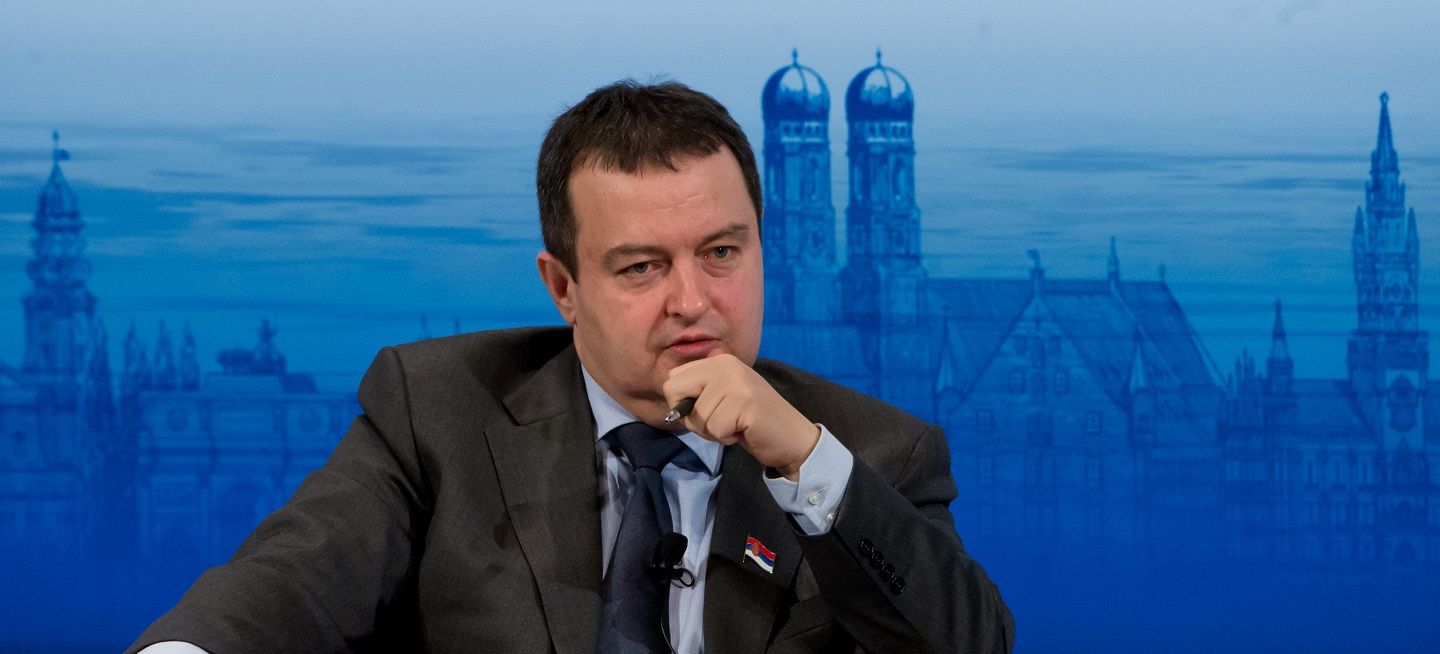
Kosovo
During the last four years, Kosovo has made visible progress in establishing new state institutions. Nonetheless, incomplete international acceptance, lack of effective control of its Serb-majority northern districts, high-level corruption charges, unemployment rates double that of Serbia, and continued “supervised independence” under the International Civilian Office (ICO) have all tested public patience. The self-styled radical Self-Determination movement, headed by Albin Kurti, has led numerous demonstrations against the perceived inadequate benefits of government compromises with the international community.
Within that context, celebration of the favorable ICJ ruling on the independence declaration soon gave way to months of political turbulence and bad press. In September 2010, the Constitutional Court ruled that then-President Fatmir Sajdu’s simultaneous service as head of state and leader of the Democratic Alliance of Kosovo (LDK) political party (established by Kosovo’s late “founding father,” Ibrahim Rugova) contravened the basic law. Sajdu’s subsequent resignation from the presidency triggered early parliamentary elections in December that were marred by accusations of fraud; in March 2011, the Court also invalidated the new parliament’s vote for construction magnate Behgjet Pacolli (leader of the New Kosovo Alliance party) as Sajdu’s successor. The following month, with American encouragement, the parliament chose non-partisan Deputy Police Director Afitite Jahjaga for the post as part of a compromise to introduce direct presidential elections. In the meantime, a controversial Council of Europe report issued by Swiss Senator Dick Marty revived accusations of connections to organized crime as well as wartime human organ trafficking against Kosovar leaders including Prime Minister Hasim Thaci of the Democratic Party of Kosovo (PDK).
These overall developments cultivated distrust in the technical negotiations with Serbia that had begun in spring 2011, which were seen as serving only Serbia’s interest in accelerating its integration into the EU. For Thaci and other political leaders, the actions to take control of the northern border posts in late July may have presented an opportunity to bolster domestic support.
That support will be tested in the next presidential elections, which are also anticipated to be held this year or possibly in 2013. A committee is already working on drafting constitutional amendments for the president to be elected directly by the people. It will be accompanied by concrete proposals for enhancing the role and power of the President and increasing the independence of other constitutional bodies. From the standpoint of Pristina, this next political campaign should ideally showcase the consolidation of democracy in Kosovo, repair its image for organizing free and fair elections, and demonstrate the political will to move ahead on the practical path of Euro-Atlantic integration.
Importantly, success in this regard would also help satisfy the remaining conditions for the end of external “supervision.” In late January 2012, the 25-nation International Steering Group (composed of the U.S. and 24 European states) announced its readiness to terminate its work and close the ICO by the end of the year, a timetable Prime Minister Thaci has also publically embraced.
The potential risk is that delays in that goal would reignite dissatisfaction with political conditions in Kosovo, just as new or restructured leadership in Serbia is settling into office. The dynamics of electoral competition in both places, possibly combined with inexperience and miscalculation, could set off a fresh round of destabilizing actions and reactions that would freeze or reverse past months’ diplomatic advances.
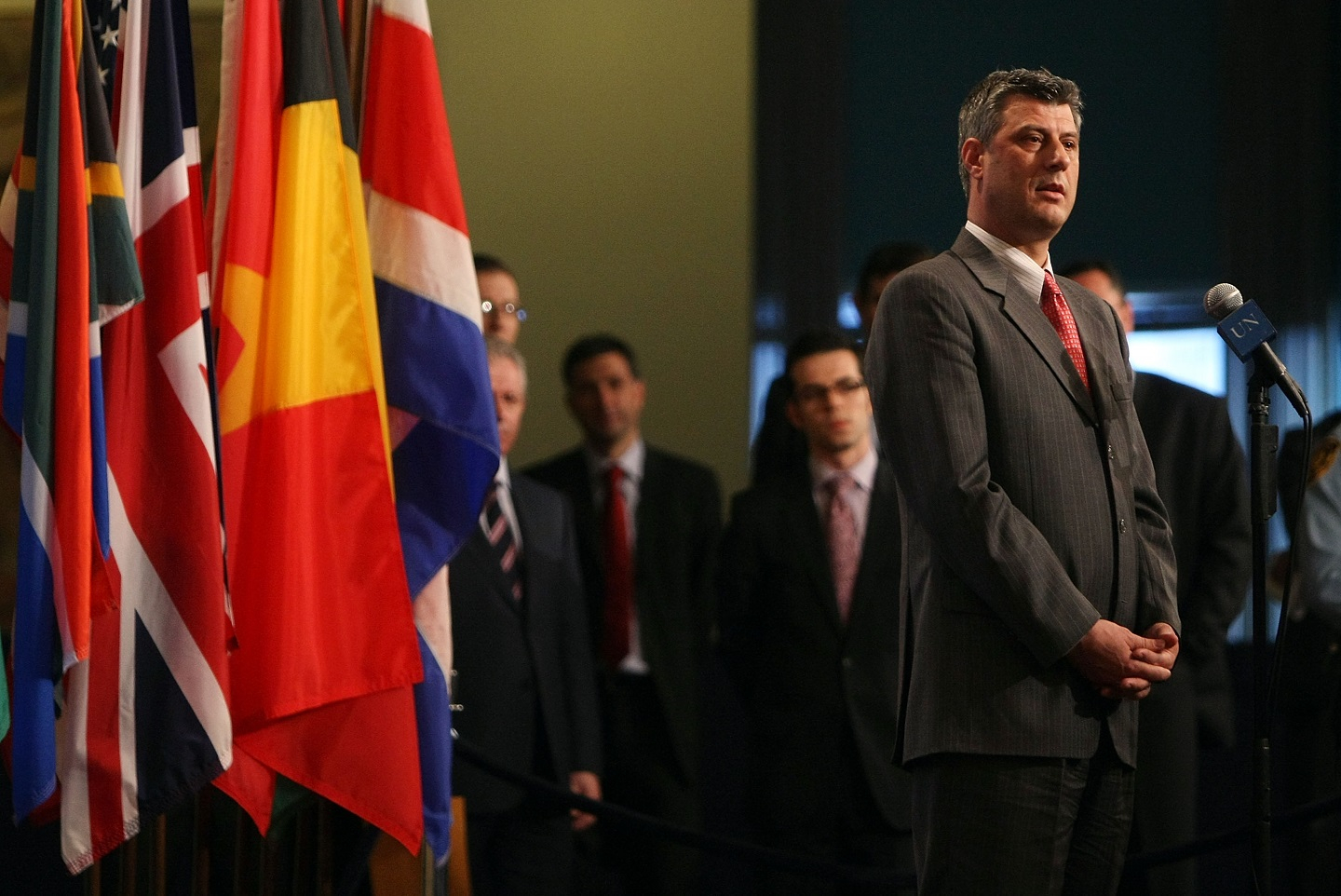
Conclusions
The very active first four months of 2012 have restored a sense of calm regarding Serbia and Kosovo. Intensified European and American diplomacy together with leaders’ attention to larger goals prevented 2011’s skirmishes over border posts and barricades from escalating into something worse. As welcome as that outcome is, however, there are several reasons for caution about the way ahead.
First, the gains involved are all partial. As noted, Serbia’s EU candidacy still requires a separate decision to start accession negotiations (which opens access to additional EU funding). Neighbors such as Croatia and Montenegro waited roughly a year for talks from the time they were named candidates, and Macedonia has waited since 2005 due to its name dispute with Greece. For Kosovo, further EU action on a Stabilization and Association Agreement beyond the Commission’s feasibility study would require consent from the five member states that don’t recognize its independence. Moreover, despite a promising start, by the latter part of March the centerpiece deal on Kosovo’s participation in regional meetings broke down, at least temporarily, over differing interpretations of whether just the asterisk after Kosovo or also the full text of the footnote needed to be displayed. Meanwhile, core issues such as governance in Kosovo’s North remain unresolved.
Second, international strategies are partly premised on both countries making the “right” political decisions in the current year. The dividing lines among Serbia’s biggest parties are not as sharply drawn as in 2008, but Euro-Atlantic officials would likely be most comfortable continuing to deal with Tadic and the Democrats in the leading state roles. A second-best scenario might be a grand coalition of the Democrats and Progressives that would give an opportunity for the latter to reassure Western partners and familiarize themselves with integration processes.
In the case of Kosovo, this would mean a consensual conclusion to amendment of the constitution and electoral law, followed by a presidential vote that is free of major irregularities and produces a unifying figure as head of state. Debate could center on the respective merits for the post of current party-politicians and Jahjaga-like nonpartisan personalities.
Third, these partial, contingent advances were obtained through EU and U.S. expenditure of key carrots they no longer hold in reserve. With the ultimate goal of full EU (and, for Kosovo at least, NATO) membership still likely at least a decade off, Euro-Atlantic partners are left with fewer intermediate levers of conflict management should those be needed.
The future of Serbia and Kosovo lies within Euro- Atlantic structures, but support for their respective aspirations cannot be a one way street. They will not gain their desired memberships only through the use of nice words, but because of concrete actions by their political classes to strengthen the rule of law, combat organized crime and corruption, and seek compromise and mutual understanding in the long-term interest of their people.
For Academic Citation
Matthew Rhodes and Valbona Zeneli, “A Make or Break Year for Serbia and Kosovo?” Marshall Center Security Insights, no. 6, May 2012, https://www.marshallcenter.org/en/publications/security-insights/make-or-break-year-serbia-and-kosovo-0.
About the Authors
Dr. Matthew Rhodes is a professor of national security studies at the Marshall Center. His work focuses on transatlantic relations and Central and Southeast European security issues.
Dr. Valbona Zeneli is a professor of national security studies at the Marshall Center. Her current research and teaching interest include Southeast European security issues, institutional reforms and economic development.
The Marshall Center Security Insights
The George C. Marshall European Center for Security Studies in Garmisch-Partenkirchen, Germany, a German-American partnership, is committed to creating and enhancing worldwide networks to address global and regional security challenges. The Marshall Center offers fifteen resident programs designed to promote peaceful, whole of government approaches to address today’s most pressing security challenges. Since its creation in 1992, the Marshall Center’s alumni network has grown to include over 13,715 professionals from 155 countries. More information on the Marshall Center can be found online at www.marshallcenter.org.
The articles in the Security Insights series reflect the views of the authors and are not necessarily the official policy of the United States, Germany, or any other governments.
